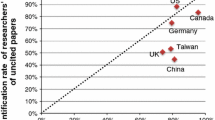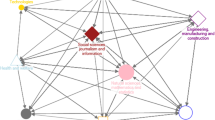Abstract
This study conducted a comparative analysis of scientific mobility by using curricula vitae (CV) and bibliometric analyses. This study analyzed data from the CVs and publications of 731 recipients of the Sloan Research Fellowship in Mathematics. The results revealed substantial differences in the prevalence of researchers with and without temporary institutional affiliations. Based on discrepancies in the number and names of institutions obtained from CV and publication analyses, researchers were categorized into 14 groups. The results of CV data and publication analyses were the same for only 6.7% of researchers. To address these disparities, adjustments were made to the numbers of home and temporary institutions for each researcher by using their CVs to accurately determine their actual affiliations. Notably, corrections were required for the majority of recipients in terms of the numbers of home and temporary institutions based on publication data, highlighting the importance of CVs in this context. This study identified several factors necessitating such corrections. Given the limitations of CV and bibliometric analyses, this study recommends combining both methodologies for comprehensive scientific mobility research.




Similar content being viewed by others
References
Ackers, L. (2008). Internationalisation, mobility and metrics: A new form of indirect discrimination? Minerva, 46(4), 41–435.
Albarrán, P., Carrasco, R., & Ruiz-Castillo, J. (2017). Are migrants more productive than stayers? Some evidence from a set of highly productive academic economists. Economic Inquiry, 55(3), 1308–1323.
Aman, V. (2018). Does the Scopus author ID suffice to track scientific international mobility? A case study based on Leibniz laureates. Scientometrics, 117(2), 705–720.
American Psychological Association. (2020). Publication manual of the American Psychological Association (7th ed.). American Psychological Association. https://doi.org/10.1037/0000165-000
Cañibano, C., Fox, M. F., & Javier Otamendi, F. (2016). Gender and patterns of temporary mobility among researchers. Science and Public Policy, 43(3), 320–331.
Cañibano, C., Otamendi, F. J., & Solís, F. (2011). International temporary mobility of researchers: A cross-discipline study. Scientometrics, 89(2), 653–675.
Cañibano, C., Otamendi, J., & Andújar, I. (2008). Measuring and assessing researcher mobility from CV analysis: The case of the Ramón y Cajal programme in Spain. Research Evaluation, 17(1), 17–31.
Carrozza, C., & Minucci, S. (2014). Keep on movin’? Research mobility’s meanings for Italian early-stage researchers. Higher Education Policy, 27(4), 489–508.
Dietz, J. S., & Bozeman, B. (2005). Academic careers, patents, and productivity. Industry experience as scientific and technical human capital. Research Policy, 34, 349–367.
Dietz, J. S., Chompalov, I., Bozeman, B., Lane, E. O., & Park, J. (2000). Using the curriculum vita to study the career paths of scientists and engineers: An exploratory assessment. Scientometrics, 49(3), 419–442.
Dubois, P., Rochet, J. C., & Schlenker, J. M. (2014). Productivity and mobility in academic research: Evidence from mathematicians. Scientometrics, 98(3), 1669–1701.
Fangmeng, T. (2016). Brain circulation, diaspora and scientific progress: A study of the international migration of Chinese scientists, 1998–2006. Asian and Pacific Migration Journal, 25, 296–319.
Gomez, C. J., Herman, A. C., & Parigi, P. (2020). Moving more, but closer: Mapping the growing regionalization of global scientific mobility using ORCID. Journal of Informetrics, 14(3), Article 101044. https://doi.org/10.1016/j.joi.2020.101044
Gureyev, V. N., Mazov, N. A., Kosyakov, D. V., & Guskov, A. E. (2020). Review and analysis of publications on scientific mobility: Assessment of influence, motivation, and trends. Scientometrics, 124(2), 1599–1630.
Horta, H., Jung, J., & Santos, J. M. (2018). Effects of mobilities on the research output and its multidisciplinarity of academics in Hong Kong and Macau: An exploratory study. Higher Education Quarterly, 72(3), 250–265.
Jonkers, K., & Tijssen, R. (2008). Chinese researchers returning home: Impacts of international mobility on research collaboration and scientific productivity. Scientometrics, 77(2), 309–333.
Jons, H. (2009). ‘Brain circulation’ and transnational knowledge networks: Studying long-term effects of academic mobility to Germany, 1954–2000. Global Networks: A Journal of Transnational Affairs, 9(3), 315–338.
Kawashima, H., & Tomizawa, H. (2015). Accuracy evaluation of Scopus author ID based on the largest funding database in Japan. Scientometrics, 103(3), 1061–1071.
Lawson, C., & Shibayama, S. (2015). International research visits and careers: An analysis of bioscience academics in Japan. Science and Public Policy, 42(5), 690–710.
Momeni, F., Karimi, F., Mayr, P., Peters, I., & Dietze, S. (2022). The many facets of academic mobility and its impact on scholars’ career. Journal of Informetrics, 16(2), Article 101280. https://doi.org/10.1016/j.joi.2022.101280
Moustafa, K. (2020). Octopus affiliations. Scientometrics, 124(3), 2733–2735.
Payumo, J. G., Lan, G., & Arasu, P. (2018). Researcher mobility at a US research-intensive university: Implications for research and internationalization strategies. Research Evaluation, 27(1), 28–35.
Petersen, A. M. (2018). Multiscale impact of researcher mobility. Journal of the Royal Society Interface, 15(146), Article 20180580. https://doi.org/10.1098/rsif.2018.0580
Poitras, C., & Larivière, V. (2023). Research mobility to the United States: A bibliometric analysis. Scientometrics, 128(4), 2601–2614.
Pustelnikovaite, T. (2021). Locked out, locked in and stuck: Exploring migrant academics’ experiences of moving to the UK. Higher Education, 82(4), 783–797.
Robinson-Garcia, N., Sugimoto, C. R., Murray, D., Yegros-Yegros, A., Larivière, V. D., & Costas, R. (2019). The many faces of mobility: Using bibliometric data to measure the movement of scientists. Journal of Informetrics, 13(1), 50–63.
Rostan, M., & Ceravolo, F. A. (2015). The internationalization of academy: Convergence and divergence across disciplines. European Review, 23(S1), S38–S54.
Sachini, E., Karampekios, N., Brutti, P., & Sioumalas-Christodoulou, K. (2020). Should I stay or should I go? Using bibliometrics to identify the international mobility of highly educated Greek manpower. Scientometrics, 125(1), 641–663.
Sautier, M. (2022). Move or perish? Sticky mobilities in the Swiss academic context. Higher Education, 82(4), 799–822.
Subbotin, A., & Aref, S. (2021). Brain drain and brain gain in Russia: Analyzing international migration of researchers by discipline using Scopus bibliometric data 1996–2020. Scientometrics, 126(9), 7875–7900.
Teixeira da Silva, J. A., Dobránszki, J., Al-Khatib, A., & Tsigaris, P. (2020). Curriculum vitae: Challenges and potential solutions. KOME: an International Journal of Pure Communication Inquiry, 8(2), 109–127.
Trippl, M. (2013). Scientific mobility and knowledge transfer at the interregional and intraregional level. Regional Studies, 47(10), 1653–1667. https://doi.org/10.1080/00343404.2010.549119
Van Der Wende, M. (2015). International academic mobility: Towards a concentration of the minds in Europe. European Review, 23, S70–S88.
Velema, T. A. (2012). The contingent nature of brain gain and brain circulation: Their foreign context and the impact of return scientists on the scientific community in their country of origin. Scientometrics, 93(3), 893–913.
Yamashita, Y., & Yoshinaga, D. (2014). Influence of researchers’ international mobilities on publication: A comparison of highly cited and uncited papers. Scientometrics, 101(2), 1475–1489.
Zhang, L., Qian, Y., Ma, C., & Li, J. (2023). Continued collaboration shortens the transition period of scientists who move to another institution. Scientometrics, 128(3), 1765–1784.
Acknowledgements
This work was financially supported by the Center for Research in Econometric Theory and Applications (Grant No. 112L900202) which is under the Featured Areas Research Center Program by Higher Education Sprout Project of Ministry of Education (MOE) in Taiwan, the Universities and Colleges Humanities and Social Sciences Benchmarking Project (Grant no. 112L9A001), and the National Science and Technology Council in Taiwan (MOST 111-2410-H-002-013-MY2).
Author information
Authors and Affiliations
Corresponding author
Additional information
Publisher's Note
Springer Nature remains neutral with regard to jurisdictional claims in published maps and institutional affiliations.
Rights and permissions
Springer Nature or its licensor (e.g. a society or other partner) holds exclusive rights to this article under a publishing agreement with the author(s) or other rightsholder(s); author self-archiving of the accepted manuscript version of this article is solely governed by the terms of such publishing agreement and applicable law.
About this article
Cite this article
Chang, YW. Comparison of the application of curricula vitae and bibliometric analyses for tracing long-term and temporary scientific mobility. Scientometrics 128, 6509–6526 (2023). https://doi.org/10.1007/s11192-023-04853-9
Received:
Accepted:
Published:
Issue Date:
DOI: https://doi.org/10.1007/s11192-023-04853-9




